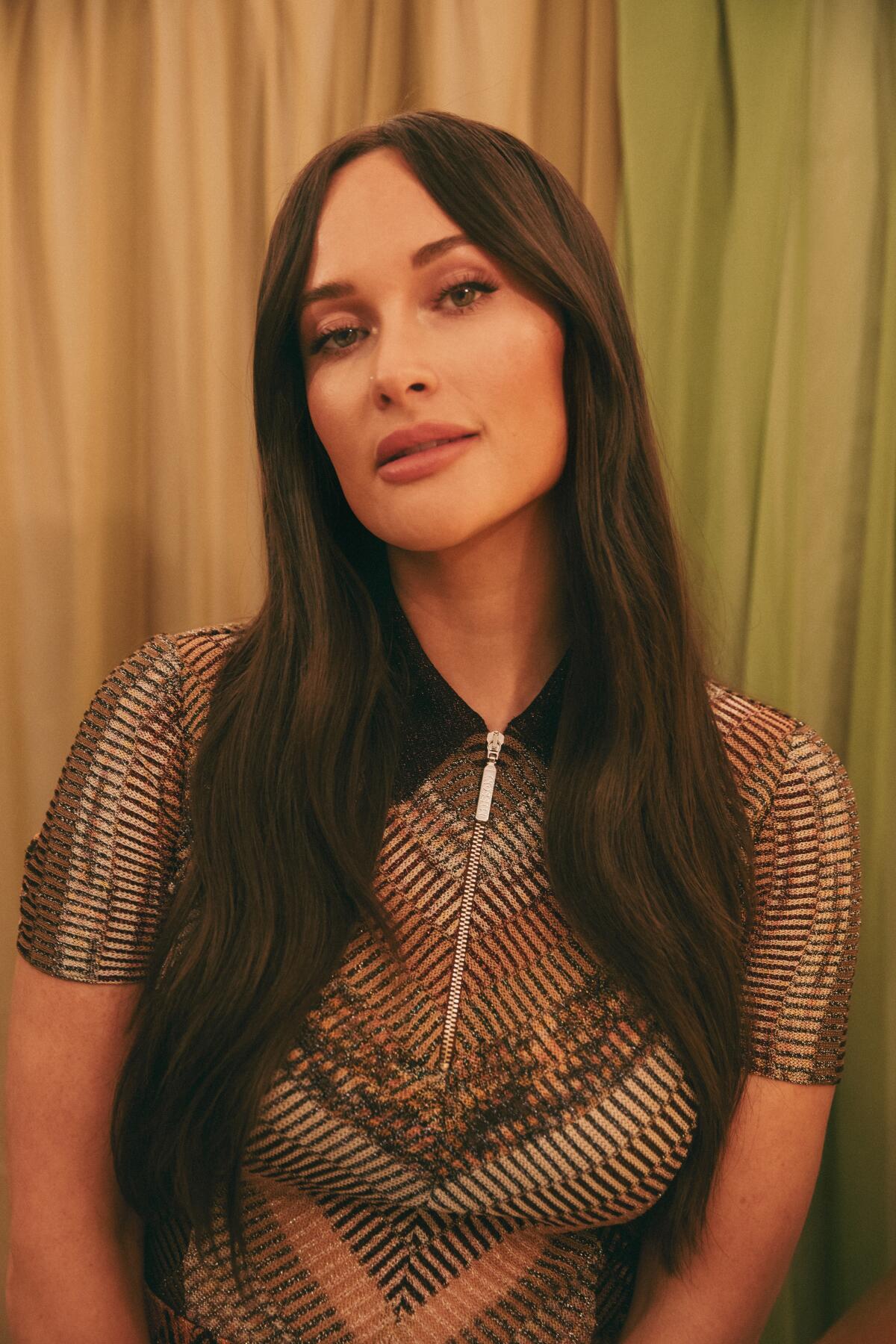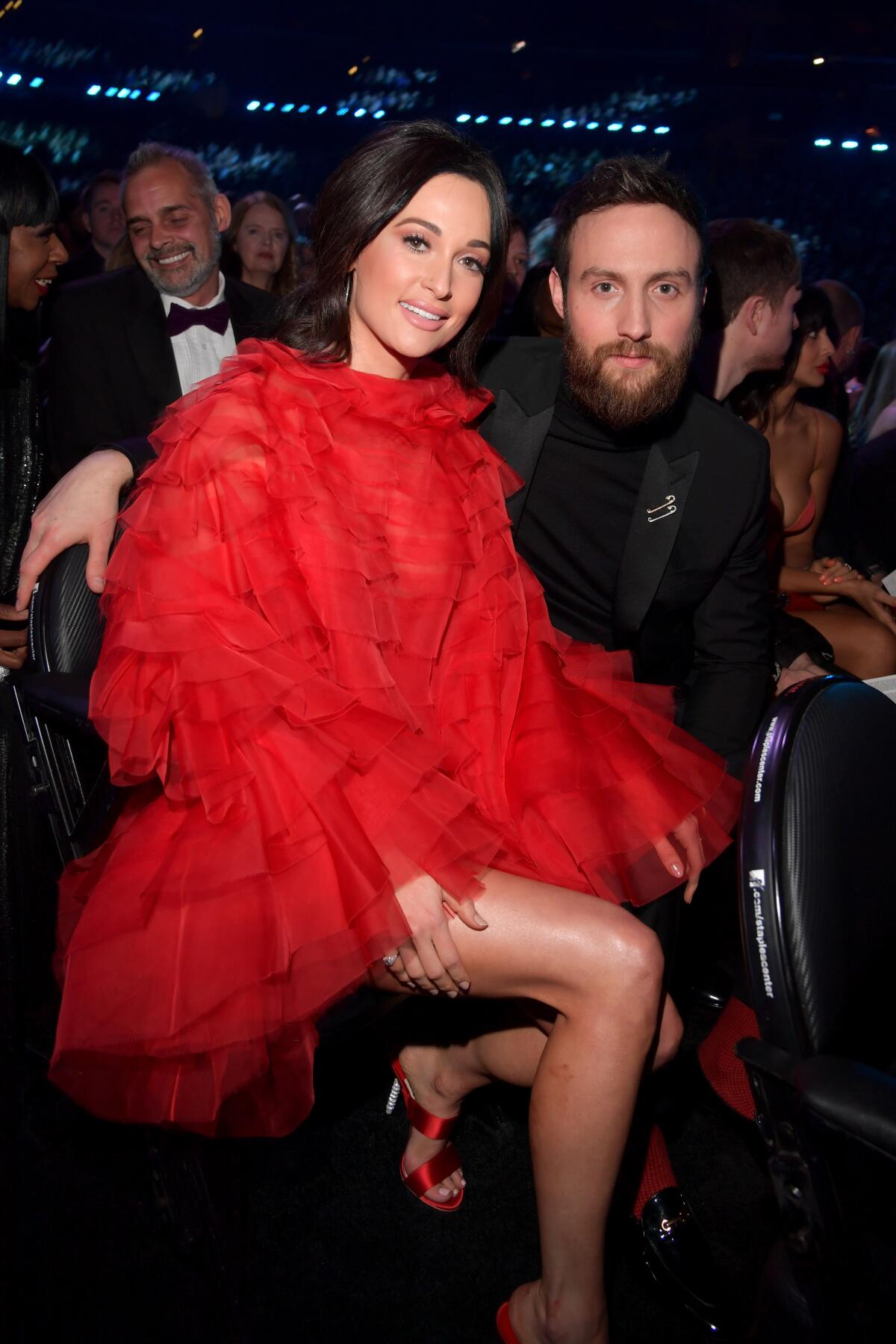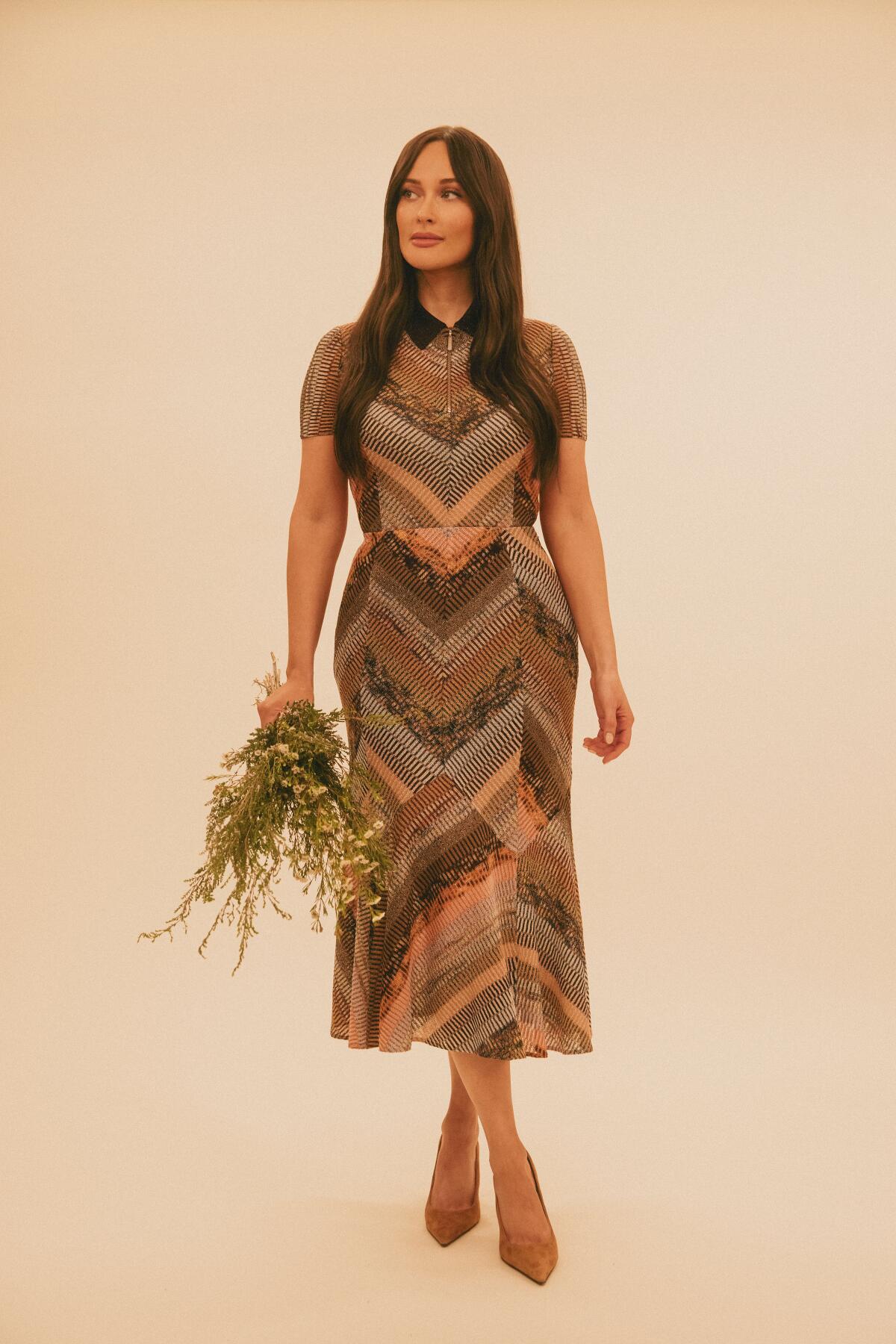“I think if you’re lucky you’re able to experience love several times,” says Kacey Musgraves.
(The Tyler Twins / For The Times)
NEW YORK — Kacey Musgraves pulls her iPhone from the pocket of her black puffer vest and starts tapping her way to a recent exchange with a friend.
“We were literally just talking about this last night,” she says. “Hold on — I want to see how I phrased it.”
The 35-year-old country star is an enthusiastic user of Apple’s audio message feature, which she says offers two advantages over regular texting: “less time staring at a god— screen,” as she puts it, and the valuable emotional data contained in a person’s voice. “I can read a note from someone and think they’re mad at me,” she says. “But then I’ll hear it, and I’m like, Oh, they’re not!”
Musgraves finds the previous evening’s monologue and zeroes in on a section where she’s musing about how “there’s so much encoded in us from childhood — past trauma, past experiences — and all that goes into falling in love with someone.” She looks up and sighs. “It honestly freaks me out to think about just how much of chemistry with another person is beyond our control.”


The precarity of romance is on Musgraves’ mind because … well, really, the idea is never not on her mind. “I’m always making something a little more sad than it needs to be,” she says with a laugh of her music, including on her breakthrough 2018 LP “Golden Hour,” which documented her whirlwind marriage to a fellow Nashville-based singer-songwriter, Ruston Kelly. Blissed-out yet laced with a stoner-ish melancholy, “Golden Hour” won the coveted album of the year prize at the Grammy Awards, vaulting Musgraves from insider-y critics’ darling to pop-crossover fashion plate; three years later, she followed it up with “Star-Crossed,” which presented the tale of her and Kelly’s divorce as a Shakespearean tragedy.
Now she’s on the cusp of releasing “Deeper Well,” a gorgeous new LP inspired in part by the act of welcoming love back into her life.
“Please don’t make me regret / Opening up that part of myself / That I’ve been scared to give again,” she sings in “Too Good to Be True,” her close-miked vocal swaddled by finger-picked acoustic guitar. Later, in the Celtic-accented “Heaven Is,” she defines that place as “lying in your arms so safe and warm.”
Yet “Deeper Well,” due Friday, is also about cultivating one’s own strength through the rituals of therapy and self-care. In the title track she sings about setting aside her gravity bong and learning the lessons of her Saturn return — a trendy astrological reference similarly deployed lately by SZA and Ariana Grande. “Saturn can be a bitch of a planet,” Musgraves acknowledges, “but it’s having a moment.” In another track, “Sway,” she describes her determination to go with the flow like “a palm tree in the wind.”
“Kacey just wants to grow,” says Shane McAnally, the prolific Nashville songwriter who’s counted Musgraves as a friend and collaborator for more than a decade. “And this record feels like roots — like something you put down with your feet solidly on the ground.”

“Deeper Well” marks a return to the rootsy, hand-played arrangements that defined Musgraves’ early work.
(The Tyler Twins / For The Times)
That goes for the album’s sound as well as its outlook. After toying with the sleek textures of Y2K-era pop and R&B for “Star-Crossed,” Musgraves returns on “Deeper Well” to the kind of rootsy, hand-played arrangements that defined her early work — and just as country music has become a go-to style for acts such as Beyoncé, Post Malone and Lana Del Rey, all of whom have country (or perhaps country-adjacent) projects on the way.
“Deeper Well” opens with the strummy “Cardinal,” in which she recounts being visited by that bird — a favorite of her mentor John Prine — not long after Prine’s death in 2020. Then there’s the waltz-time “The Architect,” a classic bit of down-home philosophizing she co-wrote with McAnally and Josh Osborne: “Even something as small as an apple / It’s simple and somehow complex / Sweet and divine, the perfect design / Can I speak to the architect?”
“‘Star-Crossed’ was more hard-edged and acidic than all my other music,” she says today. “It was more affected in terms of production. And that was fun to play with. But I was definitely craving something different for this.” What she landed on feels both cozy and exploratory — a homecoming disguised as a vision quest.
Says Reese Witherspoon, who teamed with Musgraves last year to create the Apple TV+ series “My Kind of Country”: “I think it’s her most ethereal and introspective work.”
It’s a few days before Musgraves is set to perform this month on “Saturday Night Live,” and the singer is seated at a corner table in a restaurant on the Upper East Side. Dressed in black athleisure wear, her long hair tucked beneath a Polo ball cap, she speaks wistfully about New York City, where she and her two producers, Ian Fitchuk and Daniel Tashian, decamped from Nashville last year to make “Deeper Well” amid a motivating change of scenery.
“There’s always something weird to see here,” Musgraves says. “Last night we got stuck behind this trash truck that for some reason had bouquets of flowers tied to it.” She fondly recalls a late night singing karaoke and another one downing Guinness at an Irish dive bar; she describes the smell of weed in Washington Square Park as though it were a cherished childhood memory.
Tashian identifies one benefit to their immersion in New York’s much-ness. “I think for someone who has maybe slight ADHD tendencies — I don’t know if Kacey’s copped to that, but I can tell you from experience that she most certainly has a little of that going on — sometimes you need to be overwhelmed by the world to focus,” the producer says.


Indeed, there’s an almost Zen-like quality to the sparsely arranged “Deeper Well” that makes even the tasteful “Golden Hour” sound busy by comparison. “The small details define everything,” says John Janick, chairman and chief executive of Musgraves’ record company, Interscope Capitol Labels Group. “Each song is a delicate expression of self.” With echoes of Jim Croce and Simon & Garfunkel in their heads, Musgraves, Fitchuk and Tashian set up in the same warmly appointed attic space that Jack Antonoff favors at the historic Electric Lady Studios in the Village; for “Heaven Is” they moved out onto the building’s roof to catch a vibe.
Musgraves compares the album to “a walk through nature,” which she knows registers as an irony in light of the urban setting. But there’s something to that in the way the stripped-down music showcases the essentials of her astute songwriting and her high, clear voice.
“Kacey sings just like she talks,” says Chris Thile, whose band Nickel Creek will open for Musgraves on the road this fall. “The honesty of it disarms you at every turn.” Adds singer Madi Diaz, who recruited Musgraves to appear on her 2023 single “Don’t Do Me Good”: “She delivers the complexities of life the way we actually go through it.”

Kacey Musgraves and Ruston Kelly during the 61st Grammy Awards in 2019.
(Lester Cohen / Getty Images for The Recording Academy)
Does she ever regret writing so nakedly about relationships given that they’ve all eventually ended? (Some of the tenderest songs on “Deeper Well” refer to her romance with poet Cole Schafer, with whom she broke up last year.) Musgraves shakes her head.
“I think if you’re lucky you’re able to experience love several times,” she says. “Some people just have one. Look at my sister, who met her husband when they were 14 and 16, and now they’ve got a kid. Or my grandparents, who met in second and third grade — they’ve literally lived their entire lives together. I’m just different in that way. I’ve experienced many loves, and I just gather more information about myself with each one.” She smiles. “And then I write about it.”
Musgraves grew up in tiny Golden, Texas, and started singing (and yodeling) as a precocious kid in an oversize cowgirl hat. At 18 she flamed out on the televised singing competition “Nashville Star” but used the springboard to land work as a pro songwriter on Music Row; in 2011 she co-wrote “Mama’s Broken Heart” with McAnally and their pal Brandy Clark then watched as Miranda Lambert turned the song into a No. 2 country hit.


Her success behind the scenes led to a major-label record deal of her own. Yet right away Musgraves was scraping against country orthodoxy: “Follow Your Arrow,” from her 2013 debut, advised listeners to “roll up a joint” and to “kiss lots of boys — or kiss lots of girls if that’s something you’re into.”
“From Day 1, I feel like people have known exactly what I’m about,” she says. “Still one of the greatest compliments anyone’s ever paid me has been people in the LGBTQ community saying, ‘I’ve always loved country music but I never felt like I was invited to that party until I heard your music.’”
Nashville is more inclusive these days than it was a decade ago thanks in part to Musgraves, who’s maintained her efforts to diversify the industry, as with “My Kind of Country,” a competition show meant to spotlight talent from underrepresented backgrounds. (Asked what she makes of the broader political climate in Tennessee, where Gov. Bill Lee recently signed a law restricting drag performances, she says, “Pretty bleak,” and adds, “I don’t think it’s the drag queens that are desecrating society.”)

Kacey Musgraves says she’s wary of the “trap” of modern pop stardom, in which “people want you to be extremely authentic until your authenticity doesn’t align with whatever they want.”.
(The Tyler Twins / For The Times)
Still, she says, “I don’t feel like I need to be the spokesperson for country music.” In 2018, genre purists debated what it meant that “Golden Hour” contained a disco song in the shimmering “High Horse”; in 2021, the Recording Academy ruled that “Star-Crossed” wasn’t eligible for the Grammys’ country album category. Musgraves finds all the gatekeeping a bit boring. “I just do my own thing,” she says with a shrug — including cutting “I Remember Everything,” her hit duet with Zach Bryan that won the country duo/group performance award at this year’s Grammys ceremony.
Six months after it debuted atop Billboard’s Hot 100, “I Remember Everything” is still hanging around inside the chart’s top 10, which you can take as proof that the much-discussed country boom is real. But if Musgraves is always eager to reach new listeners — see her collaborations with Troye Sivan and Camila Cabello and her stint as Harry Styles’ warm-up act — she’s also wary of what she calls the “trap” of modern pop stardom, in which “people want you to be extremely authentic until your authenticity doesn’t align with whatever they want.”
There’s a song on “Deeper Well” called “Lonely Millionaire” that suggests she’s encountered fame’s illusory comforts. “Look, I’m not saying money doesn’t make things easier,” she says. “But the deeper I get into my career, the more I find refuge in the real, tangible, irreplaceable stuff.”
Next month Musgraves is due to launch a world tour behind “Deeper Well,” and she’s been trying to figure out how to bring the album’s intimate truths into an arena. She’s also considering covering SZA’s “Nobody Gets Me” — “It’d be sick, right?” she asks — and Sivan’s “One of Your Girls.” “So sweet, that little boy,” she says of Sivan. “I just want to put him in my pocket.”
A couple of years ago, Musgraves would’ve viewed a tour as a welcome opportunity to leave home. She’d bought a big fancy place in Nashville after her divorce — you can watch her give a tour to Architectural Digest on YouTube — but discovered before long that she didn’t feel comfortable there by herself.
“I was kind of scared of alone time — not scared, but trepidatious,” she says. “I’d get anxiety about being alone and not having anything on my schedule.” One night in 2022 she started perusing Zillow; she found a spot in the woods she liked and decided to live there instead.
Now she’s “gotten really good at being alone,” she says. “I actually feel recharged by it, which is the opposite of how I used to be.” She laughs. “When I’m home now, I could not see anyone for days and not give a s—.”
This story originally appeared on LA Times

